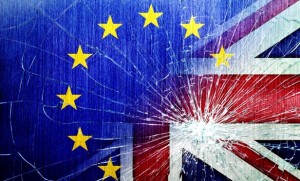'This result compounds the uncertainty facing markets' - lawyers on the impact of the election
A round-up of reaction to last night's shock election results
June 09, 2017 at 08:18 AM
8 minute read
Partners may not have wanted a Labour government, according to our survey published yesterday, but they feared the prospect of a hung parliament even more, with more than 60% of respondents believing activity levels would fall during the next 12 months in the event of no party winning an outright majority.
With Theresa May currently trying to cling to power via a deal with the DUP after losing her majority in an extraordinary election night, here we round up reaction to the results, as well as some of the more colourful anonymous contributions to our election poll.
 Lee Ranson, co-chief executive officer, Eversheds Sutherland
Lee Ranson, co-chief executive officer, Eversheds Sutherland
"Like everyone else, there is some surprise, but in all seriousness – should we have been surprised? I don't think the campaign the Conservative party ran resonated that well with the general public – there were lots of signs that that was the case and the results reflect that.
"The starting point is it will remain a Conservative government with a reduced majority and dependence on another party to get things done. It waters things down – when you are in a minority government you have to compromise, that's what the Conservative party will have to do and that will flow through its approach to austerity measures and its approach to Brexit.
"On one hand, you see the DUP and think they are more hardline on Brexit, but the reality is any deal now has to go back to parliament, and it will only take one or two people to mean it won't get approval. In those circumstances, the wise money is on the softening of Brexit.
"For the short term, there obviously will be uncertainty – while people work out what is happening, how stable this coalition government will be, and how the Brexit discussions will be dealt with. Those things will have to settle over the next few weeks. Business might be encouraged by a softening of Brexit – it might be more confident that ultimately in two years' time, it won't need to have a completely transformed business model and that a lot of the things that have come from access to the single market may remain. If business gets comfortable with that we may see an upturn, but short term, there is going to be uncertainty. If I had a pound, I might put it on an election inside the next 12 months."
 Owen Lysak, banking and finance partner, Clifford Chance
Owen Lysak, banking and finance partner, Clifford Chance
"A hung parliament widens the gap between business and political timelines. A clear UK negotiating position seems distant, while businesses are accelerating their contingency plans. As the general election played out, businesses, and especially financial services firms, have been advancing their Brexit contingency plans in the absence of a clear steer from government.
"Now, with a hung parliament, there is a serious question as to whether a new government will have its Brexit tactics and strategy in place before negotiations are scheduled to start on 19 June. Businesses may be disappointed that the desired clarity in the UK's negotiating position has moved further over the horizon."
- Big Question responses – on Theresa May:
"The Empress has no shoes. Theresa's May performance in the general election has been poor."
"A deeply unimpressive campaign by Ms May. She had enough cards in her hand to win by 200 seats. Her parroting of empty slogans in answer to perfectly legitimate questions and her uncomfortable and defensive manner hardly inspire confidence, while her u-turns make 'strong and stable' a poor joke."
——————————————————————————————————————————————
 Sharon White, chief executive, Stephenson Harwood
Sharon White, chief executive, Stephenson Harwood
"This result further compounds the uncertainty facing markets during what is an ongoing time of geopolitical upheaval. The sooner a government is formed, the more likely that markets and the value of the pound will stabilise. However, uncertainty surrounding Brexit has certainly not dissipated: this result reintroduces the debate around the type of arrangement that the UK will seek – particularly as the DUP are known not to favour a 'hard' Brexit."
 Richard Woolich, UK head of tax, DLA Piper
Richard Woolich, UK head of tax, DLA Piper
"Assuming the Conservative Party forms the next government with the support of the Unionists, then so far as tax policy is concerned, and subject to the demands of the Unionists, the Conservatives should be able to maintain their drive for low corporate taxes, and no increases in income tax for the higher paid. The planned reduction in corporation tax from 19% to 17% in 2020 should go ahead, subject to the state of public finances, and subject to any deal done with the EU as part of the Brexit negotiations."
Rob Aird, corporate partner, Ashurst
"Irrespective of whether a coalition or minority government is formed, it is unlikely that businesses and citizens can expect a prompt resolution of any key issues in the Brexit negotiations. If there is a coalition, there will need to be extensive negotiations between the parties as to what their key objectives and negotiating positions are (in addition to their domestic policies) before anything can be hoped to be achieved in negotiations with EU.
"If a minority government, there will be the uncertainty as to what the reaction of parliament will be to any deal, which may well affect the way the EU approaches the negotiations. What this result does mean, in all likelihood, is that the UK has just taken a giant step closer to the much feared 'cliff-edge' where UK businesses lose all their access rights to the single market overnight in March 2019."
"Brexit will be a catastrophe. Nobody could negotiate a departure on non-disastrous terms. Asking whether Corbyn or May would be a better Brexit negotiator is a bit like asking which bucket of s**t you would rather eat. Both are spirit-sappingly inept, and continue to betray an almost complete lack of understanding of the practical issues."
"Unless it is stopped, Brexit will be a catastrophe unparalleled in any major economy in peacetime. There is no upside. The calamitous economic consequences are obvious but there is no area of national endeavour which will be undamaged."
"I honestly find it hard to imagine a worse case scenario for the UK if we leave without any exit deal, as our cretinous leaders continue to put forward as a possibility. Complete economic and societal collapse would certainly be on the table. If we go through with this, historians around the globe will be teaching it as an extraordinary cautionary tale for decades – how it was that a broadly successful, prosperous country effectively chose to wipe itself off the map."
——————————————————————————————————————————————
Robert Meakin, international projects and construction partner, Clyde & Co
"In addition to the broader implications for the country, a hung parliament could be the worst possible result for business. With the economy already struggling with the uncertainty of Brexit, the last thing we need is further confusion and delay in the government's investment strategy.
"The Article 50 clock is also ticking and business will be eager to ensure that there is a clear and consistent voice at the negotiating table, so as to minimise further damage to the economy. The sooner a viable government is in place, however it's composed, the better."
Edward Bibko, head of EMEA capital markets partner, Baker McKenzie
"For capital markets the significance of the result relates to Britain's path in the Brexit negotiations. Overall the market reaction has been subdued, but there are parallels to the initial reactions to the Brexit referendum with the more domestically-focused FTSE 250 down and the exporters of the FTSE 100 rising on a weaker pound. We will likely continue to see strong interest in the UK as a listing venue among larger and international companies. In the short term there may perhaps be less investor interest in companies affected by a weaker pound or with significant Brexit exposure."
Carol Hopper, real estate partner, Ropes & Gray
"This result may well lead to a market correction, which could increase deal activity, as investors looks to sell positions and opportunistic buyers selectively look to take advantage of that."
James Miller, managing partner, RPC
"A hung parliament will potentially cause a lot of uncertainty for the business community, which has been closely watching the campaigning unfold in the lead-up to the election. Whilst we are yet to see how the markets and business community will respond, and much will depend on the government's actions in the next few days, the result risks undermining business confidence, particularly in light of Article 50 being triggered."
This content has been archived. It is available through our partners, LexisNexis® and Bloomberg Law.
To view this content, please continue to their sites.
Not a Lexis Subscriber?
Subscribe Now
Not a Bloomberg Law Subscriber?
Subscribe Now
NOT FOR REPRINT
© 2025 ALM Global, LLC, All Rights Reserved. Request academic re-use from www.copyright.com. All other uses, submit a request to [email protected]. For more information visit Asset & Logo Licensing.
You Might Like
View All
Israel's Rushed Corporate Tax May Spark Law Firm Mergers, Boost Large Firms Including Gornitzky
4 minute read
Ex-Mayer Brown Corporate Lawyer Leads Race for German Chancellor in Snap Election
4 minute read
Mexico Dissolves Antitrust Authority in Setback to Competition

Apple Subsidiaries in Belgium and France Sued by DRC Over Conflict Minerals
2 minute readTrending Stories
- 1'It's Not Going to Be Pretty': PayPal, Capital One Face Novel Class Actions Over 'Poaching' Commissions Owed Influencers
- 211th Circuit Rejects Trump's Emergency Request as DOJ Prepares to Release Special Counsel's Final Report
- 3Supreme Court Takes Up Challenge to ACA Task Force
- 4'Tragedy of Unspeakable Proportions:' Could Edison, DWP, Face Lawsuits Over LA Wildfires?
- 5Meta Pulls Plug on DEI Programs
Who Got The Work
Michael G. Bongiorno, Andrew Scott Dulberg and Elizabeth E. Driscoll from Wilmer Cutler Pickering Hale and Dorr have stepped in to represent Symbotic Inc., an A.I.-enabled technology platform that focuses on increasing supply chain efficiency, and other defendants in a pending shareholder derivative lawsuit. The case, filed Oct. 2 in Massachusetts District Court by the Brown Law Firm on behalf of Stephen Austen, accuses certain officers and directors of misleading investors in regard to Symbotic's potential for margin growth by failing to disclose that the company was not equipped to timely deploy its systems or manage expenses through project delays. The case, assigned to U.S. District Judge Nathaniel M. Gorton, is 1:24-cv-12522, Austen v. Cohen et al.
Who Got The Work
Edmund Polubinski and Marie Killmond of Davis Polk & Wardwell have entered appearances for data platform software development company MongoDB and other defendants in a pending shareholder derivative lawsuit. The action, filed Oct. 7 in New York Southern District Court by the Brown Law Firm, accuses the company's directors and/or officers of falsely expressing confidence in the company’s restructuring of its sales incentive plan and downplaying the severity of decreases in its upfront commitments. The case is 1:24-cv-07594, Roy v. Ittycheria et al.
Who Got The Work
Amy O. Bruchs and Kurt F. Ellison of Michael Best & Friedrich have entered appearances for Epic Systems Corp. in a pending employment discrimination lawsuit. The suit was filed Sept. 7 in Wisconsin Western District Court by Levine Eisberner LLC and Siri & Glimstad on behalf of a project manager who claims that he was wrongfully terminated after applying for a religious exemption to the defendant's COVID-19 vaccine mandate. The case, assigned to U.S. Magistrate Judge Anita Marie Boor, is 3:24-cv-00630, Secker, Nathan v. Epic Systems Corporation.
Who Got The Work
David X. Sullivan, Thomas J. Finn and Gregory A. Hall from McCarter & English have entered appearances for Sunrun Installation Services in a pending civil rights lawsuit. The complaint was filed Sept. 4 in Connecticut District Court by attorney Robert M. Berke on behalf of former employee George Edward Steins, who was arrested and charged with employing an unregistered home improvement salesperson. The complaint alleges that had Sunrun informed the Connecticut Department of Consumer Protection that the plaintiff's employment had ended in 2017 and that he no longer held Sunrun's home improvement contractor license, he would not have been hit with charges, which were dismissed in May 2024. The case, assigned to U.S. District Judge Jeffrey A. Meyer, is 3:24-cv-01423, Steins v. Sunrun, Inc. et al.
Who Got The Work
Greenberg Traurig shareholder Joshua L. Raskin has entered an appearance for boohoo.com UK Ltd. in a pending patent infringement lawsuit. The suit, filed Sept. 3 in Texas Eastern District Court by Rozier Hardt McDonough on behalf of Alto Dynamics, asserts five patents related to an online shopping platform. The case, assigned to U.S. District Judge Rodney Gilstrap, is 2:24-cv-00719, Alto Dynamics, LLC v. boohoo.com UK Limited.
Featured Firms
Law Offices of Gary Martin Hays & Associates, P.C.
(470) 294-1674
Law Offices of Mark E. Salomone
(857) 444-6468
Smith & Hassler
(713) 739-1250










